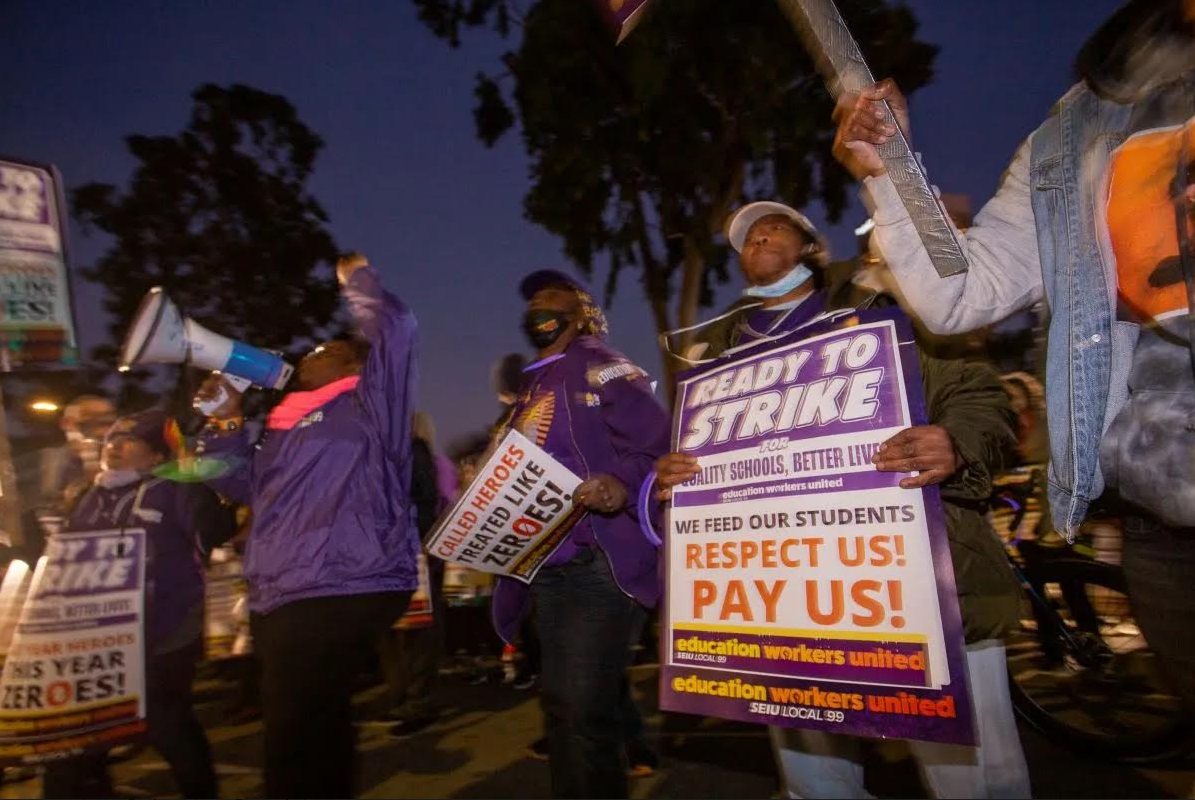Wave Wire Services
LOS ANGELES — With the threat of a strike looming, hundreds of Los Angeles Unified School District unionized employees gathered for a rally in downtown’s Grand Park March 15 amid stalled labor talks.
Service Employees International Union Local 99, which represents roughly 30,000 cafeteria workers, bus drivers, custodians, special education assistants and other workers, staged the rally and were joined by members of United Teachers Los Angeles, which represents the district’s teachers and others, totaling another 30,000 workers.
Both unions are working to negotiate new labor pacts with the district, but those talks have been fruitless thus far. SEIU, which has declared an impasse in talks, announced plans earlier this month to cancel its existing contract, moving the union closer to a possible strike. UTLA followed suit a week later, and said its members would honor picket lines if SEIU called a strike.
SEIU-represented workers voted in February to authorize the union to call a strike if negotiations failed, and such a walkout could be announced during the rally, with a strike potentially lasting three days.
LAUSD Superintendent Alberto Carvalho sent a message to district parents and staff March 13 saying that a walkout by more than 60,000 workers would likely mean a closure of all schools in the district.
“We would simply have no way of ensuring a safe and secure environment where teaching can take place,” Carvalho said. “We will give you as much advance notice as possible, but we encourage you to begin discussions with your employer, child care providers and others now.”
District officials said last week that Carvalho had made the SEIU union “one of the strongest offers ever proposed by a Los Angeles Unified superintendent.” According to the district, the offer included a 5% wage increase retroactive to July 2021, another 5% increase retroactive to July 2022 and another 5% increase effective July 2023, along with a 4% bonus in 2022-23 and a 5% bonus in 2023-24.
“Ultimately, we must do what is in the best interest of our students as well as our workforce, which includes exercising fiscal responsibility,” the district statement said. “Our general fund is not a flexible budget reserve — the district cannot go bankrupt. We need to be united in our efforts to provide every child with access to a high-quality public education that will prepare them for success in school and life.”
SEIU officials are asking for a 30% wage increase across the board, while UTLA has been pushing for a 20% raise. The unions have pointed to the district’s projected $4.9 billion reserve fund for 2022-23, while also citing rising inflation and housing costs.
“Workers are fed-up with living on poverty wages — and having their jobs threatened for demanding equitable pay,” Max Arais, SEIU Local 99 executive director, said in a statement last week. “Workers are fed-up with the short staffing at LAUSD — and being harassed for speaking up.
“We demand that LAUSD stop the unlawful activity, our workers are ready to take stronger action to protest these unfair practices. Canceling our contract is not a decision we make lightly. But it’s clear that LAUSD does not respect or value the work of essential workers in our schools.”
Union officials have said the affected workers earn an average salary of $25,000 a year and have been working without a contract since June 2020.
The union declared an impasse in negotiations in December, leading to the appointment of a state mediator.
In addition to salary demands, union officials have also alleged staffing shortages caused by an “over-reliance on a low-wage, part-time workforce.”
The union alleged shortages including insufficient teacher assistants, special education assistants and other instructional support to address learning loss and achievement gaps; substandard cleaning and disinfecting at school campuses because of a lack of custodial staff; jeopardized campus safety due to campus aides and playground supervisors being overburdened; and limited enrichment, after-school and parental engagement programs due to reduced work hours and lack of health care benefits for after-school workers and community representatives.










